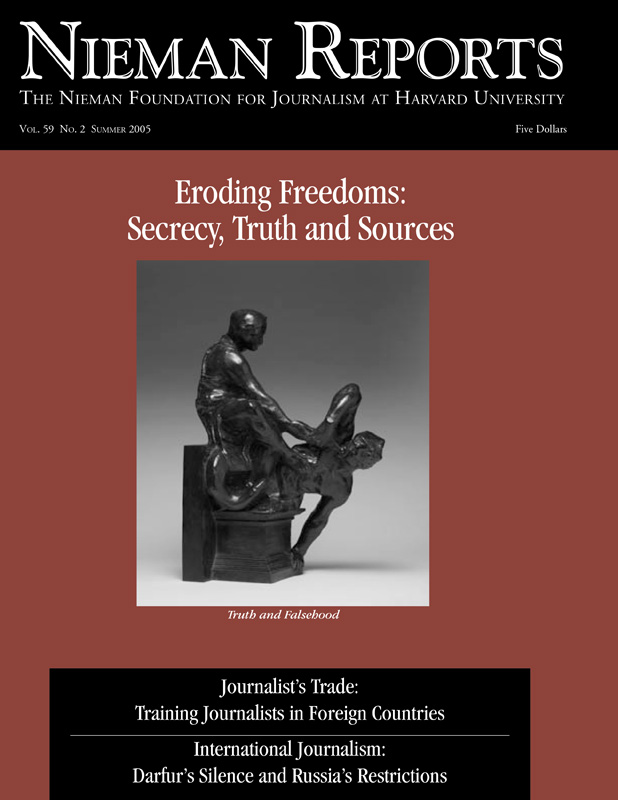
Eroding Freedoms: Secrecy, Truth and Sources
Among the casualties of the invasion and occupation of Iraq have been truth and trust, according to Sig Christenson, military affairs writer for the San Antonio Express-News. After working as both an embedded and independent reporter in Iraq, he writes about the “propaganda war within Gulf War II,” explaining that “Its roots are in Ground Zero, and I have been a willing participant. So, too, were many other reporters.”
The excerpt that follows appears in the conclusion to the Iowa Law Review article written by Randall P. Bezanson and Gilbert Cranberg.
RELATED ARTICLE
"Introducing a New Concept Into Libel Law"
- Randall P. Bezanson and Gilbert CranbergThe very premise on which the current actual malice rule rests is that of a functioning press engaged in journalism and its aims of truthful and important and professionally judged information widely disseminated to a public audience—a press in which judgments about coverage, editorial processes and policy, and organization are made with journalism and its values in mind. Such policies may be controversial. They may involve the sacrifice of long-embraced editorial processes or journalistic standards in order to preserve a news organization, to strengthen it in the long run, or to participate in its constant and dynamic changes over time.
But what about changes in process, production, organization, or incentives in the newsroom that have nothing to do with journalism and everything to do with the parent company’s financial interests in the stock market, or the value of options, or the unbroken string of quarters and years in which revenues and margins have increased? What about decisions about process and production and incentive and newsroom resources that take no serious account of journalistic quality (or the consequences of its loss), and that are made with awareness of and indifference to the sacrifice of truth? Should decisions about the newsroom made in the face of known and material increases in risk of error and with indifference to journalism be protected by active malice, an ill-fitting standard that focuses on the particular story and not on its systematic cause, and that rests on the incorrect assumption that the institution to be benefited by actual malice’s protective shield is one devoted first and foremost to journalism?
It is our view that actual malice does not fit such “institutional” choices to foster falsehood by corporate policies or processes instituted in reckless disregard of truth and of the values and standards of journalism. We believe that the First Amendment itself would be better served by a rule of liability for institutional reckless disregard for the truth. It would require that journalism and its values be placed in the balance when business decisions are made by news enterprises. It would allow editors as news professionals to be full participants in such choices, not simply designated implementers of decisions made elsewhere. It would permit persons harmed by institutionally reckless falsehoods to seek compensation for corporate acts that bear no relation to the First Amendment. It would require institutional decision-makers to internalize—to feel directly—the costs that their decisions impose on the press and the values of the First Amendment.
RELATED ARTICLE
"Introducing a New Concept Into Libel Law"
- Randall P. Bezanson and Gilbert CranbergThe very premise on which the current actual malice rule rests is that of a functioning press engaged in journalism and its aims of truthful and important and professionally judged information widely disseminated to a public audience—a press in which judgments about coverage, editorial processes and policy, and organization are made with journalism and its values in mind. Such policies may be controversial. They may involve the sacrifice of long-embraced editorial processes or journalistic standards in order to preserve a news organization, to strengthen it in the long run, or to participate in its constant and dynamic changes over time.
But what about changes in process, production, organization, or incentives in the newsroom that have nothing to do with journalism and everything to do with the parent company’s financial interests in the stock market, or the value of options, or the unbroken string of quarters and years in which revenues and margins have increased? What about decisions about process and production and incentive and newsroom resources that take no serious account of journalistic quality (or the consequences of its loss), and that are made with awareness of and indifference to the sacrifice of truth? Should decisions about the newsroom made in the face of known and material increases in risk of error and with indifference to journalism be protected by active malice, an ill-fitting standard that focuses on the particular story and not on its systematic cause, and that rests on the incorrect assumption that the institution to be benefited by actual malice’s protective shield is one devoted first and foremost to journalism?
It is our view that actual malice does not fit such “institutional” choices to foster falsehood by corporate policies or processes instituted in reckless disregard of truth and of the values and standards of journalism. We believe that the First Amendment itself would be better served by a rule of liability for institutional reckless disregard for the truth. It would require that journalism and its values be placed in the balance when business decisions are made by news enterprises. It would allow editors as news professionals to be full participants in such choices, not simply designated implementers of decisions made elsewhere. It would permit persons harmed by institutionally reckless falsehoods to seek compensation for corporate acts that bear no relation to the First Amendment. It would require institutional decision-makers to internalize—to feel directly—the costs that their decisions impose on the press and the values of the First Amendment.


